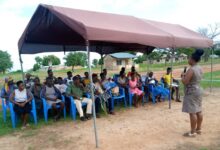It is sad to learn that three persons got drowned in floods following last Friday’s heavy rains in Accra and its environs.
It is possible that there are unreported incidents like injuries elsewhere.
The cost of property destroyed and businesses disrupted is yet to be quantified.
Flooding and its devastating impacts anywhere in the country are heart-breaking because those who lose their lives could be breadwinners whose painful premature passing could undermine the future of their dependents unless providence emerges.
It is not in dispute that flooding from a downpour is a natural disaster and as a natural occurrence, the downpour cannot be prevented.
However, humans can take measures to control flooding and its devastation, yet it appears state organisations that are supposed to help do this are either clueless or do not care a hoot about the negative impacts of flooding on members of the public, particularly the vulnerable.
Instead of these organisations, including the National Disaster Management Organisation (NADMO), the district assemblies, the Ministry of Works and Housing, Ministry of Local Government and Rural Development and Ministry of Health (MoH), being proactive, they mostly wait and react to the situation.
The case of NADMO is most appalling, to say the least, because instead of the officials planning how to tackle the root causes of flooding, they always think about what to do when it occurs.
For instance, in an interview on March 25, this year with the Ghana News Agency (GNA) on flooding in some areas in Accra following a morning downpour, Mr George Ayisi, the Communication Director at NADMO, said the organisation had strengthened its emergency preparedness to respond to flooding across the country.
And the preparedness was that the organisation’s rescue and operation teams were ready and on standby to immediately assist flood victims and help them to safety.
It appears NADMO officials are satisfied with just what their organisation’s name suggests – manage it; do not prevent it, not even where something humanly possible and proactively can be done about the situation.
In that same interview, Mr Ayisi said in spite of their preparedness, the general public must take precautionary measures.
That is a good point but it gives NADMO out as an organisation which does not know enough about the character of the people it has been established to serve.
Ghanaians need constant reminders and real check on their negative attitudes and so NADMO needs to adopt sustained planned public education and available law to cause those precautionary measures to happen.
How much of that effort has the organisation made? If it had done much of this education, a video in which a woman carrying her baby and wading through last Friday’s flooding would not have emerged.
This is because she, as member of the public, would have considered the risk involved in her action.
We are happy she got away with her risky behaviour but we condemn the thumb ups being given her.
It seems the officials love receiving relief items for distribution to flood victims and probably benefit thereby.
The experts have long stated that the amount of rainfall classified as heavy in this country is projected to increase between 2010 and 2050, with the wet seasons going to get wetter and the dry seasons drier.
This should remind NADMO that the best flood response and recovery action involves advance planning, which includes collaboration with the relevant institutions and public education , to ensure that flooding impacts fewer people and requires reasonable resources to deal with it.



